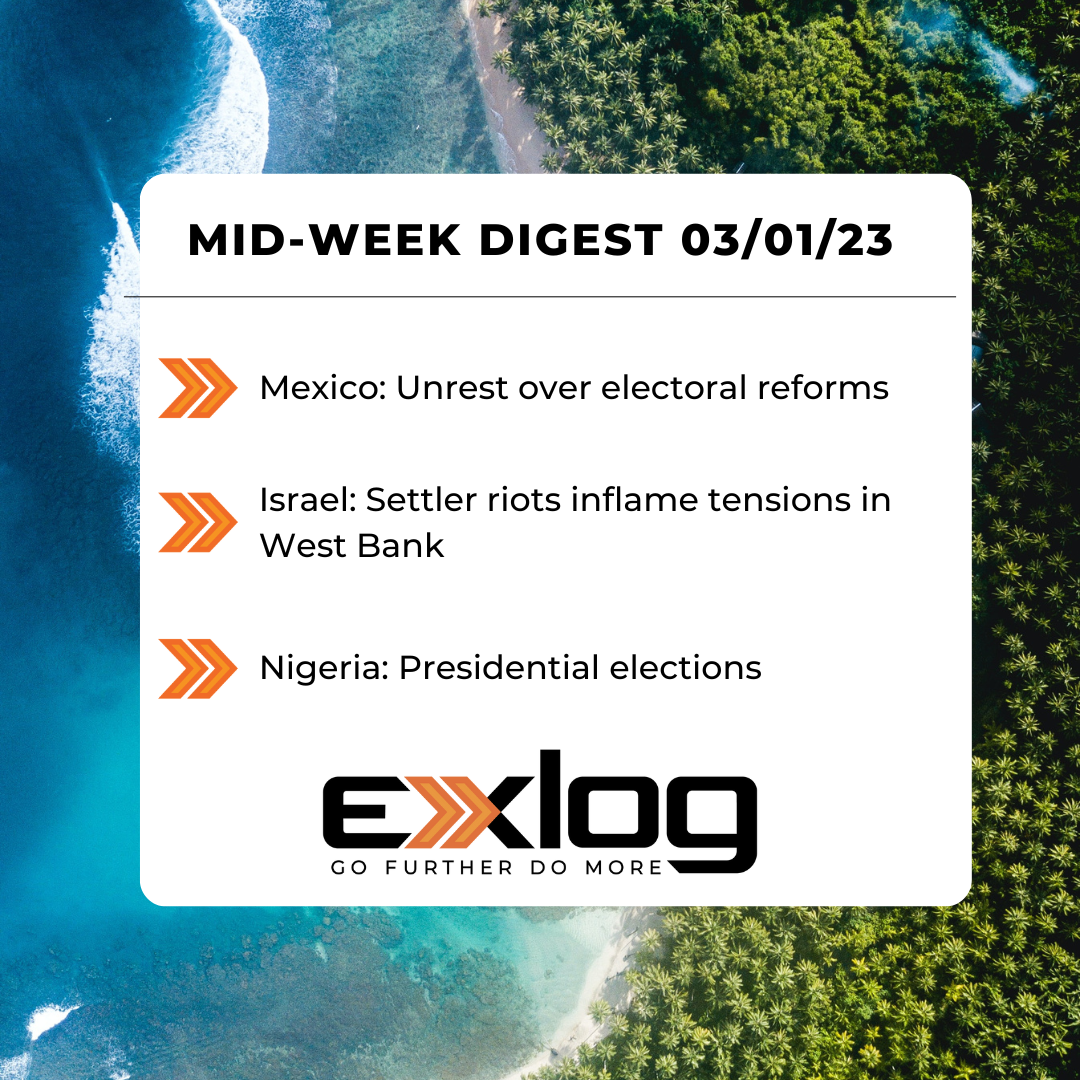Unrest over electoral reforms in Mexico, settler riots inflame tensions in West Bank and presidential elections in Nigeria
Mexico: Tens of thousands protest divisive electoral reforms
Tens of thousands of protesters took to the streets across Mexico on Feb. 26 in response to proposed electoral reforms that are expected to diminish the authority and responsibilities of the National Electoral Institute (INE). Mexico City saw the greatest number of participants as up to half a million people reportedly gathered at the national square (Plaza de la Constitución, also known as Zócalo) to voice their discontent with the administration of President Andrés Manuel López Obrador (AMLO) and the proposed legislation. The protests spilled into adjoining streets in the capital but proceeded without incident. In preparation for the demonstrations, authorities closed several central streets and metro stations, although no prolonged, large-scale disruptions to travel or business operations were reported. Smaller, peaceful demonstrations also materialized in more than 100 cities across the country, including Monterrey, Guadalajara, Guanajuato, Culiacán, Puebla, Toluca, Mérida, and Torreón. Opponents of the legislation argue that the INE has been instrumental in Mexico’s transition from single party rule to democracy since 2000 when an opposition party won the presidency for the first time in more than 70 years. The legislation reduces the INE’s budget, cuts staffing by approximately 85% as well as diminishes the responsibilities of the institute, which will not be transferred to another entity. Having been approved by the Senate – dominated by AMLO’s party MORENA – on Feb. 22, the reforms now only await enactment by the President. AMLO argues the reorganization will save USD 150 million a year and reduce the influence of economic interests in politics, though opponents of the reforms fear they will weaken the sanctions the INE can impose on candidates and parties that violate campaign finance rules. Opposition lawmakers and civil society groups vowed to challenge the changes at the Supreme Court, which would have to annul the reforms by June 2. Further demonstrations over the legislation are expected in the short term, particularly as the Supreme Court initiates the review of the proposed changes. Additional protests will likely trigger travel disruptions and could potentially interrupt business operations in and around major cities.
Israel: Settler riots highlight deteriorated security in West Bank
Sectarian tensions and the threat of retaliatory attacks remain elevated following a violent riot by Israeli settlers in the West Bank, south of the city of Nablus, overnight Feb. 26-27 that resulted in extensive property damage and numerous casualties. Dozens of homes, businesses, and cars were set on fire, local residents and emergency responders were attacked, and Israeli security forces deployed teargas in the town of Huwara. Security incidents were also reported in at least four nearby villages including Zatara, where one person was shot and killed. Israeli security forces estimate that 300 to 400 individuals – some armed with guns and knives – participated in the unrest. The Palestinian Red Crescent reported on Feb. 27 that 392 people were injured during the violence, with most suffering symptoms related to teargas inhalation. Local media have described the riot as being triggered by the shooting deaths of two Israeli settlers by a Palestinian attacker near Huwara on Feb. 26. Although violent incidents involving Palestinians and Israeli settlers are common in the West Bank – given the proliferation of Israeli settlements in occupied areas – the scale and intensity of the most recent riot are exceptional. The episode reflects a severe deterioration in the overall security environment in recent months, characterized by frequent Israeli military raids in the West Bank and a rise in targeted attacks by militants within Israel. In an effort to prevent further unrest, the Israeli military has deployed several hundred soldiers to the impacted areas; increased security checkpoints have been reported throughout Nablus Governorate in recent days. Nonetheless, there remains a significantly elevated threat of civil unrest and retaliatory sectarian violence in Israel and the West Bank in the near term – including protests in cities such as Tel Aviv against settler violence and attacks targeting Israeli civilians in East Jerusalem. Increased tensions are highly likely to sustain through the Ramadan (March 22-April 21) and Passover (April 5-13) holidays, which are often marked by violent unrest around religious sites
Nigeria: Presidential vote exposes electoral system weaknesses
Ruling party candidate Bola Ahmed Tinubu secured a win in Nigeria’s presidential election held on Feb. 25, triggering fraud allegations from the opposition parties, which likely indicates a continued political dispute over election results. According to the National Electoral Commission (INEC), Tinubu obtained roughly 37% of the vote, while two other prominent candidates, Atiku Abubakar and Peter Obi, polled 29% and 25%, respectively. None of the opposition parties have accepted the results, and Abubakar’s People’s Democratic Party (PDP) has called for a new vote, citing widespread electoral irregularities. No large-scale demonstrations materialized following the vote aside from a small protest denouncing alleged electoral fraud at Millennium Park in Abuja. However, incidents of voter harassment and petty and ballot theft, in addition to arson and shooting attacks targeting polling stations occurred in several states, including Lagos, Imo, Bayelsa, Edo, and Kogi. Violence and voter intimidation are common during elections in Nigeria, as demonstrated by several attacks against INEC facilities in Enugu, Owerri, and Abuja in the months leading up to the vote. While most of the election-related violence was concentrated in the southern regions, suspected members of Islamic State West Africa Province (ISWAP) conducted a mortar attack targeting INEC offices in Gwoza, Borno state, although no significant damage or fatalities were reported. Despite the official declaration of the winner, tensions among political parties and legal challenges surrounding the election outcome are likely to persist in the short term, indicating that an uptick in politically-motivated violence and civil unrest should not be ruled out in the coming weeks.


